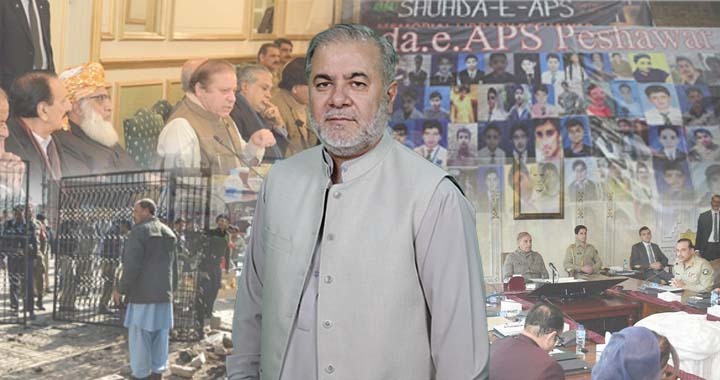As Pakistan faces one of its deadliest years in recent history, the rift between the federal government and PTI’s Khyber Pakhtunkhwa (KP) government has exposed a troubling reality: the fight against terrorism is not being lost on the battlefield alone, but in the political arena as well. The lack of coordination, mistrust, and political point-scoring between Islamabad and Peshawar are undoing years of hard-earned gains under the National Action Plan (NAP), leaving the province once again vulnerable to militant resurgence.
When Unity Becomes a Casualty
The tragedy of Pakistan’s counter-terrorism effort lies not in a lack of plans, but in the failure to follow through. After the Army Public School (APS) massacre in 2014, the nation came together to devise NAP—a rare moment of unity that cut across political and institutional divides. It carried clear, actionable points: reform the judicial process through military courts, strengthen NACTA, regulate madrasas, curb hate speech, and ensure the writ of the state.
For a time, there was progress. NACTA functioned, terrorist executions resumed, and coordination improved. But as the violence ebbed, so did our resolve. Pakistan’s political and religious leadership—once united by grief and urgency—soon forgot the very framework they had agreed to implement. Today, many citizens do not even remember NAP existed.
KP’s Isolation in the Fight
The ongoing rift between the KP government and the federation is a dangerous luxury. The province, which remains the front-line of Pakistan’s war against terror, cannot afford to stand alone. KP neither has the resources nor the institutional strength to tackle a transnational insurgency on its own. Yet, instead of cooperation, we see confrontation: the provincial government devising its own counter-terrorism “ToRs,” accusing the centre of non-cooperation, and even announcing intentions to send delegations to Kabul—initiatives that not only defy the spirit of NAP but also the constitutional limits of provincial authority.
The Afghan Taliban have repeatedly stated in Doha, Turkey, and elsewhere that they will not act militarily against the TTP, offering only mediation. What then does Peshawar expect to achieve through unilateral outreach? Such moves may generate political mileage, but they offer no strategic benefit. Militancy will not end through provincial diplomacy—it demands unified national resolve.
A Crisis of Political Will
The absence of coordination between the federation and provinces has crippled the counter-terrorism framework. Terrorism is not the only area where this gap exists, but it is certainly the most dangerous. The PTI-led KP government fears that any cooperation with the federal government will be seen by its workers as betrayal—especially with Imran Khan in jail. But governance cannot wait for the release of one man. This is the party’s third term in KP, and development, security, and administration cannot be held hostage to politics.
Projects funded federally are stalled, infrastructure has deteriorated, and no major initiative from Islamabad has reached KP in recent months. The province needs investment, coordination, and political maturity—not isolation and defiance.
Revisiting the Spirit of NAP
Pakistan’s counter-terrorism policy was built on deterrence, accountability, and control over extremist narratives. That foundation has eroded. Those responsible for hate speech, misuse of loudspeakers, and incitement go unchecked. Unregistered madrasas continue to operate freely, some funded by sources the state itself does not monitor.
There must be consequences. The state must demonstrate that crimes against citizens, institutions, or the constitution will not go unpunished. Our failure to do so has created a culture of impunity where terrorists and their facilitators exploit weaknesses in both the legal and political systems.
Beyond Politics: What Must Be Done
Pakistan’s current counter-terrorism challenge is not simply a security crisis—it is a governance crisis. Federal and provincial leaders must set aside political egos and meet with open hearts. Terrorism does not distinguish between political affiliations. The people of KP are Pakistanis first, and their suffering demands collective ownership.
There are encouraging signs that KP’s leadership has reached out to other political parties. This must not be a symbolic gesture. If sincerity exists and a clear plan is on the table, there is no reason why the centre and provinces cannot sit together again, as they did after APS, to revive NAP in both spirit and structure.
The Afghan Connection
The upcoming talks between Pakistan and Afghanistan in Turkey will be crucial, but expectations must remain realistic. Past meetings in Doha and Istanbul show that dialogue helps lower tensions but cannot, by itself, end cross-border militancy. What both countries can do immediately is separate trade from politics. Restoring commercial ties will help rebuild trust and alleviate pressure on ordinary people who have suffered most from these disruptions.
Pakistan must restore the discipline of NAP, not as a document, but as a mindset. The state must reclaim its writ, ensure justice is served, and eliminate space for political opportunism in matters of national security. The fight against terrorism cannot be won by slogans or delegations. It requires unity, sincerity, and above all, continuity—something Pakistan has tragically lacked for too long.





